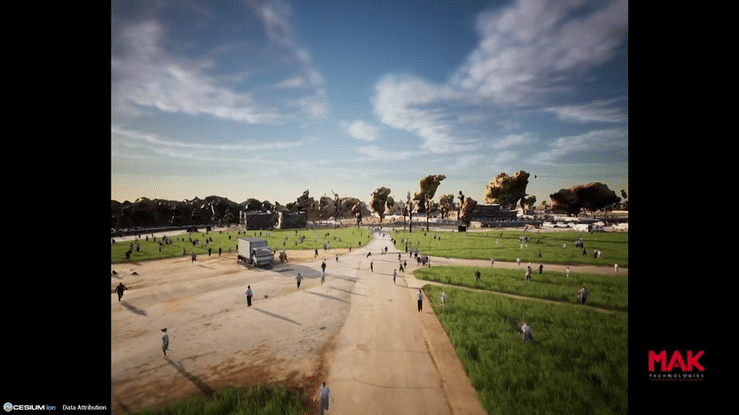
MAK Legion Update: Legion 1.1 and the SISO Study Group
By Matt Figueroa
A few months ago, Len Granowetter outlined our MAK Legion technology, which enables large-scale simulations that support thousands or even millions of high fidelity entities. I'm providing an update on where MAK Legion is today and a look at where we're taking it.
Legion 1.1
We released MAK Legion 1.1 in June, which added several important features making it easier to manage and connect to high-entity count scenarios through enhanced server-side Fine Interest Filtering. Fine Interest Filtering is a capability in Legion that reduces the processing load on each Legion client without reducing fidelity. Here's how: since each client in Legion establishes geographic regions of interest and intent, the MAK Legion server calculates the cross-sections of each client's geographic region and sends only the entities and interactions located in that cross-section.
Beyond Fine Interest filtering, MAK Legion now supports Absolute Timestamps, which increases the accuracy of movement calculations and reduces anomalies such as jitter, which can cause entities to move in unrealistic ways. MAK Legion 1.1 adds multicast messaging for certain streams of data like voice communications, radio messages, or video streams. And we've made it possible for Legion clients to update their entities at variable rates, removing the need to update every entity in each frame.
Legion Study Group at SISO
As you know, MAK has always been a proponent of open standards — and that includes MAK Legion! We officially started a Simulation Scalability study group at the Simulation Interoperability Standards Organization (SISO) to identify the problems of scalability among distributed simulation applications and evaluate potential solutions. Alongside Keith Snively from Dynamic Animation Systems, I have the honor of co-leading the group! We kicked things off by submitting an initial API draft based on our MAK Legion product to serve as a basis for discussion. The next step is for the group to look at and evaluate Legion, while also proposing and discussing other potential scalability alternatives. Having a diverse set of members from the Modeling & Simulation community will refine and mature the Simulation Scalability Framework concept before moving it to a Product Development Group (the next step after the study group) within SISO.
We're excited by the progress we're making with MAK Legion and look forward to its continued growth! If you would like to learn more about MAK Legion, connect with us at

